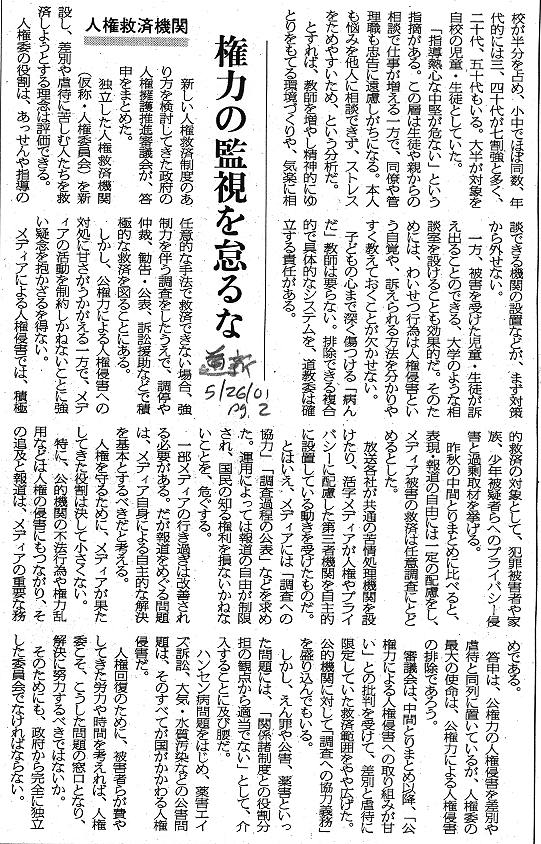法務省、人権擁護推進審議会の答申、人権救済創設に関する記事
(2001年5月26日付)
(背景に、2001年1月31日の法務省人権擁護部推進審議会事務局主催人権救済制度に関する公聴会についてはここです。)
Brief in English: (日本語はこの後)
After a series of hearings on discrimination in Japan (click
here for info on the Jan 31, 2001 Sapporo Hearing), a deliberation council sponsored
by the Ministry of Justice, Department of Human Rights (Jinken Yougobu) issued a
proposal for the establishment of a Human Rights Commission (Jinken Iinkai) on May
25, 2001. It proposes, in brief (from Hokkaido Shinbun May 26, 2001, pg 1, included
in Japanese below; paraphrased translation by Arudou Debito) developing a system
where:
- Individuals suffering from discrimination and cruel treatment (gyakutai) can
seek assistance (kyuusai) in the form of mediation (choutei), arbitration (chuusai),
recommendations (kankoku), official announcements (kouhyou), and lawsuit assistance
(soshou enjo), so that activities and business practices which promote discrimination
can be stopped (haijo) in court.
- Administrative discrimination (koukenryoku ni yoru sabetsu) and cruel treatment
cannot be overlooked (kanka).
- The Mass Media will voluntarily restrain themselves from violations of human
rights, and protections will be in place for the privacy of criminal suspects.
- Perpetrators refusing to cooperate will face "constructive assistance"
(sekkyokuteki kyuusai), meaning effective investigations (jikkouteki na chousa) with
the possibility of fines. The media will face "voluntary investigations"
(nin'i chousa).
- A "Human Rights Commission" (jinken iinkai), under which this system
will be enforced, will be a consultative body established independent of the government.
This sounds progressive, but nowhere in the documentation (author Arudou Debito
received an original copy of the proposal for his part in the Jan 31 Sapporo Hearing)
is protection against discrimination by nationality or national origin mentioned
("race, belief, gender, social identity, family lineage, disability, illness,
sexual orientation", or "jinshu, shinjou, seibetsu, shakai teki mibun,
monchi, shougai, byouki, seiteki shikou", from page-nine article below). The
press does not notice this; it unfortunately dwells on the potential for infringement
of its investigative capacities.
Asked for a comment by a Kyodo reporter, I answered (in translation), "It's
a positive step. However, I worry about the effectiveness of the commission in terms
of staffing and financing. Also, assistance in lawsuits is also no substitute for
anti-discrimination legislation." There are fears that this may actually be
used as an excuse for Japan's not following international treaty obligations, i.e.
avoiding drafting and passing laws against racial discrimination.-- Arudou
Debito in Sapporo
2001.05.25 19:42 社会 157 938字
新機関に期待と疑問 「遅きに失した」の声も
(共同通信)
【編注】朝刊メモ(1)の(ハ)メーンサイド、札幌、長野、熊本、政治部、文化部注
意(80行)
人権擁護推進審議会が二十五日、人権侵害を救済する新たな機関の創設を提言した。
差別、虐待、人権侵害、プライバシー侵害…。これまで救えなかった被害をどこまで救
済できるのか。当事者から期待が寄せられる一方で、独立性などに課題が多い新機関を
疑問視する声も聞かれた。
「遅きに失しています」。国が熊本地裁判決の控訴を断念したハンセン病訴訟の東京
原告の一人、森元美代治さん(63)は、療養所の内外で差別に苦しんできた。「実験
台」として新薬ができると投与され、近くのラーメン屋は「客が来なくなる」と入所者
を追い出した。
「解決の遅れは日本人の人権意識の低さとつながっている。差別に悩む人の話を聞き
、あらゆる差別を解決する体制にしてほしい」と期待を込めた。
外国人を拒否した北海道小樽市の入浴施設相手に訴訟を起こした米国出身の有道出人
さん(36)は同審議会の公聴会で人種差別撤廃を訴えた。「法務局に人種差別改善を
要請しても差別をやめさせる権限がなかった。良いステップだ」と新機関設置を評価。
ただ「スタッフや資金が伴わないと機関が十分に機能しない恐れがある」と懸念する。
横浜刑務所に服役していた男性は九五年、看守から何度も暴行されたとして国家賠償
訴訟を起こした。国側は「自分で暴れた」と主張。一、二審は敗訴し上告中だ。
「刑務所や警察でのトラブルには公正な目撃者がまずいない。接見は妨害され裁判も
相手の監視下だ」と代理人の田鎖麻衣子弁護士。「役人ではない人を(新機関に)入れ
て強制調査権限を与えるなど、客観性を確保しなければ実効性は期待できない」と話し
た。
ストーカー被害の末、一九九九年に埼玉県のJR桶川駅前で刺殺された猪野詩織さん
=当時(21)=の母京子さん(51)は事件当時、押し掛けた報道陣に悩まされた。
「朝も夜も数十人に家を囲まれ外出もできなかった。娘を殺された上に弱い者いじめ
をされた気分。リンチだった。新しい機関ができても大多数は今のままだろう」と厳し
い口調だ。
二年前、東京・池袋の通り魔事件で娘を亡くした宮園誠也さん(66)も「事件報道
は何年も前から同じことの繰り返し。ある程度の規制はやむを得ない。メディア自身が
招いた結果」とメディアの反省を促した。
【編注】もりもと・みよじ▽あるどう・でびと▽たぐさり・まいこ▽いの・しおり▽
きょうこ▽みやぞの・せいや





ENDS





